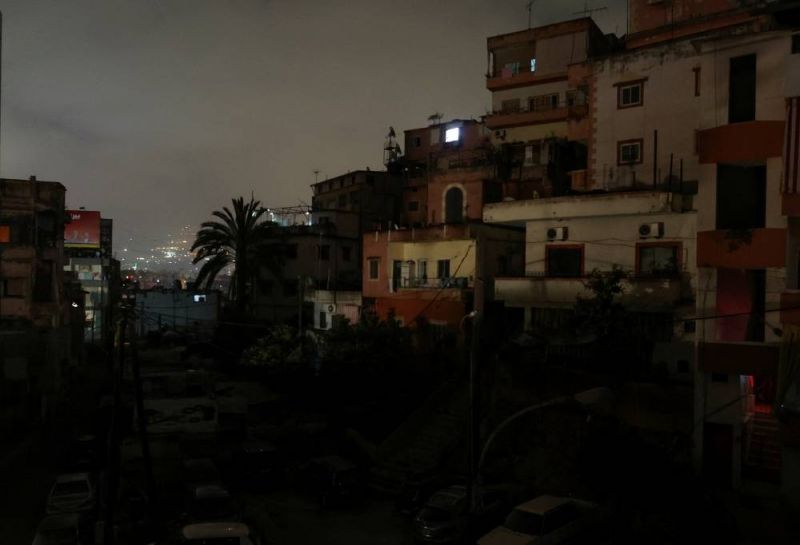
Residential buildings are pictured at night during a power cut in Beirut on April 27, 2022. (Credit: Mohamed Azakir/Reuters)
Want to get the Morning Brief by email? Click here to sign up.
Long queues at gas stations reemerged over the weekend reminiscent of last summer’s fuel crisis. However, Energy Ministry officials asserted that there is more than enough gas to meet demand and blamed the shortages on a technical delay involving one of the ships unloading gas at the port. The ministry also denied claims — including by George Brax, spokesman for the union of gas station owners —that gas prices would be fully dollarized and that Banque du Liban would stop supplying importers with dollar notes at the Sayrafa rate, which is several thousand lira lower than the parallel market rate. Since late March, BDL has supplied fuel importers with 100 percent of the value of imported gasoline in US dollars in exchange for its value in lira at the Sayrafa rate. The increase came after the price of oil crossed the $100 per barrel threshold following Russia’s invasion of Ukraine. However, BDL is quickly running through its foreign currency reserves, having spent some $500 million from the reserves in the first half of June alone.
Flour distributors have called on the government to either fully subsidize wheat or to cut the subsidy altogether. According to the state-run National News Agency, the flour distributors of the South have blamed flour shortages that they say have put them out of work for three weeks on what they termed as piecemeal solutions to the bread crisis. The wheat used for Arabic bread remains subsidized, while wheat for other purposes is not, which the flour distributors said has spurred a black market in flour. In May, the World Bank approved a $150 million emergency loan to finance wheat imports to Lebanon, but Parliament has not ratified the agreement. This came after the cabinet allocated $15 million of its International Monetary Fund granted Special Drawing Rights to wheat imports in April. Lebanon used to import most of its wheat from the Black Sea region, with Russia and Ukraine topping the list of importing countries. However, Russia’s invasion of Ukraine has hampered the latter’s exports of wheat as most of its ports have shut down.
Consultations to appoint a new Prime Minister will start this Thursday. The consultations were called for by President Michel Aoun last week after the new Parliament was sworn in and committee members were voted in. So far, caretaker Prime Minster Najib Mikati is the favorite to succeed himself, which would be his fourth term as prime minister; however, this time around he would have significantly less Sunni political cover after former Prime Minister Saad Hariri’s Future Movement boycotted the May 15 elections. Yesterday, Hezbollah MP Hassan Fadlallah said that his party would not announce its nominee for the post before Thursday.
A long-awaited gas deal between Lebanon and Egypt is set to be signed tomorrow, but this is not the end of the line for the deal. The plan to import gas from Egypt through Jordan and Syria hinges on assurances from the US that the deal would not trigger sanctions, as the countries involved are wary of US sanctions on those who do business with Syria under the Caesar Act passed in 2019. US energy official Amos Hochstein, who is also the mediator on maritime border negotiations between Lebanon and Israel, said last week in an interview with Alhurra TV that the US is waiting to see the final terms of the deal between Egypt and Lebanon to evaluate its sanctions compliance.
In case you missed it, here’s our must-read story from the weekend: “What’s on the line? How Lebanon may come up empty handed in maritime border negotiations”